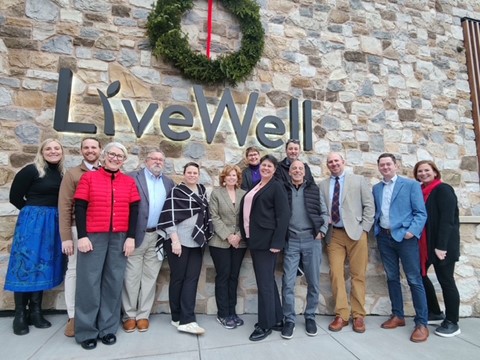
Author:
Kim Warchol, President and Founder of DCS at CPI
Five Things You Can Do to Help Someone with Dementia to Thrive During the Holiday Season
The holidays are upon us. Gatherings to celebrate the season may be plentiful. Good food and drink may be abundant. That sounds awesome. What could possibly be of concern, you might ask?
Well, for those living with dementia there are stress triggers embedded within the joyful happenings of the season. It’s important to be aware and be prepared so we can avoid inadvertently hitting those stress buttons. Let’s identify a few things you can do to help you and someone with dementia enjoy the season.
TIP #1: Be prepared, knowing how to keep stressors to a minimum.
The progressively lowered stress threshold theory helps us to understand that by midafternoon, on a normal day, a person with dementia may become over-stressed. Add in the high-octane holidays and we have a recipe for disaster because of creating stress overload. What can we do and how does it help?
Minimize stimulation. This means we try to avoid too much stimulation at one time and avoid high stimulation for too long.
- Ideally, you will have one thing happening at a time. As examples, create separate activities out of watching the kids open the presents, listening to or singing Christmas songs, and passing around the treats to enjoy. When all three things are happening simultaneously, the sensory system is overwhelmed as it’s bombarded by input. But if we do one of these at a time, it’s just enough. And someone with dementia can focus their attention better when presented with only one thing at a time, therefore enjoying it all the more.
- Have short bursts of high stimulation activity. I’d suggest each activity being 30 minutes or less and then offer some quiet time.
Keep gatherings small. There isn’t a perfect number but as a general rule, gatherings shouldn’t be so large as to have multiple conversations or many things going on at once. It’s also beneficial for attention to keep gathering small because someone with dementia can focus better when they are closer to the source.
Keep the person in their own environment. When someone has dementia, adjusting to change is hard and stressful. Bringing the party to the person allows them to stay in their familiar “home”, which brings comfort, safety and security. Scheduling the party around their usual routine (e.g. planning the holiday meal at the typical time they eat or allowing them to wind down at their typical bedtime) also helps with stress reduction.
TIP #2: Watch for early signs of stress and respond to calm.
As said above, someone with dementia can become over-stressed by too much noise, too much activity, change, and too many people. Watch for the earliest indicators of the person becoming stressed, and do something about it. Never ignore it.
- Early signs of stress include rocking, pacing, furrowed brow or worried look, wringing hands, pacing, tearful etc.
- When we see these indicators of anxiety, STOP and respond to calm. Never push through. For example, if after a few minutes of Millie watching the children play and open their gifts you notice Millie looking restless and her facial expression looks worried or frightened, go over to check on her. Even if she says she is ok, but you can see she looks anxious or stressed, accompany her to a quiet place to rest. Even 15-30 minutes in a relaxed environment can help calm and reset the sensory system.
TIP #3: Tap into long-term memory. It’s a preserved ability that can have tremendous benefits.
A decline in short term memory, which is our ability to recall things that happened in the recent past, is one of the primary symptoms of dementia and often one of the first problems associated with Alzheimer’s disease. On the other hand, long-term memory, or memories from months or years ago is a strength late into the disease.
Memories tend to be held longer when associated with music, the sense of smell, or things that conjure up strong emotions.
So, what can we do to work with preserved memory abilities and how does it help?
- Choose holiday songs the person loves and finds most familiar and this will likely lead to improved attention, participation, and enjoyment. Music helps connect to long-term memories (like how to play the piano) and past emotional experiences (like gathering with family). Music can encourage movement (like dancing). Music can tap into preserved language (like singing a song). Music is powerful in many ways as it connects to our limbic system which activates memory and emotions.
- Choose favorite food and drink and/or those that represent traditions. When offering favorites and having familiar aromas wafting through the air, the desire and ability to eat, drink, or even help prepare the meal will likely be enhanced.
Knowing short-term memory is a weakness, what can we do to help?
- As said earlier, avoid change and maintain familiar routines as much as possible.
- Also, this can be difficult, but we want to do our best to avoid saying “Don’t you remember” because it can make the person feel inadequate or broken. They likely don’t remember and pointing it out makes the situation uncomfortable. Instead of saying “Don’t you remember” I suggest we compassionately respond by answering the same question multiple times or offering that forgotten fact. But the key is to always be gentle and sensitive to the discomfort of experiencing memory loss.
TIP #4: Have fun and savor the moment, making it the best it can be, without harking back on how things used to be.
If the person with dementia is your loved one, this is an important tip. We can get stuck in sadness if our thoughts swirl around what holidays with your loved one used to be and how different that may be today. The shift for well-being for all is to accept, embrace and celebrate “what is”, today. What are the moments of connection you can share now, that still matter? Yes, there will be losses from dementia and there will be changes in rituals, relationships, abilities, and roles as a result. It is very hard to keep ourselves from reflecting on what used to be, but we must. Good things happen if we can accept and make the very most, of what is.
TIP #5: Check your own stress level and give yourself permission to take a break.
Individuals living with dementia rely on hired or family caregivers in many ways. All of us must remember to put on our own oxygen mask first in order to be of help to others. Holiday stress is real for everyone. Although the season is fun, there is a lot going on and it can feel overwhelming. We all need a break and a reset sometimes. Ask for it, guilt free. Remembering we can’t be of help to others unless we are ok helps us to shift the paradigm, recognizing our need to take a break as a selfless act, and not a selfish one.
This is the last blog of 2024 and I want to thank you for all you do to make the world a better place for those living with dementia. And happy holidays! May the spirit of the season burn bright, bringing you peace and joy, and to all those you hold dear.
Invest in yourself and your team!
Gain the knowledge and skills to optimize function, safety, and quality of life for those you serve and certifications to distinguish yourself or your organization as a leader!
December 2024
Share This Post:
Tell Me More!
Learn how our solutions can benefit you or
your organization.
Continue Learning:



